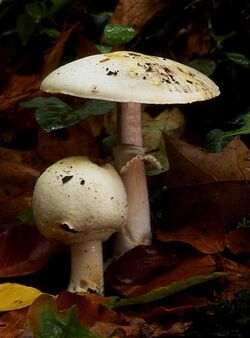Biology:Agaricus silvicola
| Agaricus silvicola | |
|---|---|

| |
| Scientific classification | |
| Domain: | Eukaryota |
| Kingdom: | Fungi |
| Division: | Basidiomycota |
| Class: | Agaricomycetes |
| Order: | Agaricales |
| Family: | Agaricaceae |
| Genus: | Agaricus |
| Species: | A. silvicola
|
| Binomial name | |
| Agaricus silvicola (Vittad.) Peck (1872)[verification needed]
| |
| Agaricus silvicola | |
|---|---|
| Mycological characteristics | |
| gills on hymenium | |
| cap is convex or flat | |
| hymenium is free | |
| stipe has a ring | |
| spore print is brown | |
| ecology is saprotrophic | |
| edibility: edible or can cause allergic reactions | |
Agaricus silvicola, also known as the wood mushroom or woodland agaricus,[1] is a species of Agaricus mushroom related to the button mushroom. A. silvicola is a member of Agaricus section Arvenses, a group of morphologically similar mushrooms.[2] A. silvicola, like other species in Agaricus section Arvenses, exhibits a positive Schäffer's reaction and potassium hydroxide reaction, and smells of almonds or anise.[3]
Taxonomy
Originally described as the variety Agaricus campestris var. silvicola by Carlo Vittadini in 1832, it was promoted to distinct species status by Charles Horton Peck in 1873.[4]
Varieties with larger bases have been described as A. abruptibulbus.[5]
Description
The cap is light cream, and bruises yellow ochre when damaged. It is 5–15 cm (2–6 in) in diameter, which makes it slightly smaller than its close relative Agaricus arvensis, the "horse mushroom." The stem is 5–15 cm (2–6 in), and usually has a bulbous base.[6] It is much the same color as the cap, and has a fragile drooping ring. The flesh is thin and white, and smells of almond or anise.[7] It looks fairly similar to a young death cap.[8]
The spores are brown, elliptical, and smooth.[6]
Distribution and habitat
Agaricus silvicola grows in both deciduous and coniferous woodland in Britain, Europe, and North America.[9] It has also been reported in South Asia, namely Bangladesh[10] and Pakistan .[11] Appearing in the autumn, it is rarely seen in huge numbers, usually just a few, or solitary.[7]
Edibility
It is edible and popular in Europe.[12][13] It is suspected to have caused an allergic reaction in a few people in North America.[8] (This reference is not supported by clinical cases).
Similar species
- Agaricus abruptibulbus[5]
- Agaricus albolutescens[5]
- Agaricus arvensis[5] – the horse mushroom
- Agaricus campestris – the field mushroom
- Agaricus hondensis[6]
- Agaricus osecanus[7]
- Agaricus semotus[6]
- Agaricus subrutilescens[6]
- Agaricus xanthodermus – the yellow stainer[6]
See also
References
- ↑ Arora, David (1986). Mushrooms demystified: a comprehensive guide to the fleshy fungi (Second ed.). Berkeley: Ten Speed Press. ISBN 978-0-89815-169-5.
- ↑ Mitchell, A. D.; Bresinsky, A. (1999-09-01). "Phylogenetic relationships of Agaricus species based on ITS-2 and 28S ribosomal DNA sequences". Mycologia 91 (5): 811–819. doi:10.1080/00275514.1999.12061086. ISSN 0027-5514. https://doi.org/10.1080/00275514.1999.12061086.
- ↑ Boniface, Tony (2020-01-01). "The use of odours in the identification of mushrooms and toadstools" (in en). Field Mycology 21 (1): 28–30. doi:10.1016/j.fldmyc.2020.01.010. ISSN 1468-1641.
- ↑ "Agaricus silvicola (Vittad.) Peck". MycoBank. International Mycological Association. http://www.mycobank.org/BioloMICS.aspx?Table=Mycobank&Rec=768&Fields=All. Retrieved November 11, 2012.
- ↑ 5.0 5.1 5.2 5.3 Trudell, Steve; Ammirati, Joe (2009). Mushrooms of the Pacific Northwest. Timber Press Field Guides. Portland, OR: Timber Press. pp. 191. ISBN 978-0-88192-935-5. https://books.google.com/books?id=WevHvt6Tr8kC.
- ↑ 6.0 6.1 6.2 6.3 6.4 6.5 Davis, R. Michael; Sommer, Robert; Menge, John A. (2012). Field Guide to Mushrooms of Western North America. Berkeley: University of California Press. pp. 228. ISBN 978-0-520-95360-4. OCLC 797915861. https://www.worldcat.org/oclc/797915861.
- ↑ 7.0 7.1 7.2 Phillips, Roger (2006). Mushrooms. Pan MacMillan. ISBN 0-330-44237-6.
- ↑ 8.0 8.1 "California Fungi—Agaricus silvicola". http://www.mykoweb.com/CAF/species/Agaricus_silvicola.html. Retrieved January 18, 2008.
- ↑ Arora, David (1986). Mushrooms Demystified. Ten Speed Press. ISBN 0-89815-169-4. https://archive.org/details/mushroomsdemysti00aror_0.
- ↑ Das, K.; Aminuzzaman, F. M.; Akhtar, N. (25 February 2017). "Diversity of fleshy macro fungi in mangrove forest regions of Bangladesh". Journal of Biology and Nature 6 (4). https://www.researchgate.net/publication/330535834.
- ↑ Razaq, A.; Shahzah, S. (2007). "Agaricus silvicola, a new record from Pakistan". Pakistan Journal of Botany 39 (1). http://pakbs.org/pjbot/PDFs/39(1)/PJB39(1)309.pdf.
- ↑ "Agaricus sylvicola (Vittad.) Peck". Archived from the original on June 6, 2011. https://web.archive.org/web/20110606010226/http://www.mtsn.tn.it/bresadola/gallery.asp?code=137&lang=eng. Retrieved January 18, 2008.
- ↑ "Agaricus silvicola (Vittad.) Peck (1887)". http://www.grzyby.pl/gatunki/Agaricus_silvicola.htm. Retrieved January 18, 2008.
Wikidata ☰ Q384480 entry
 |

